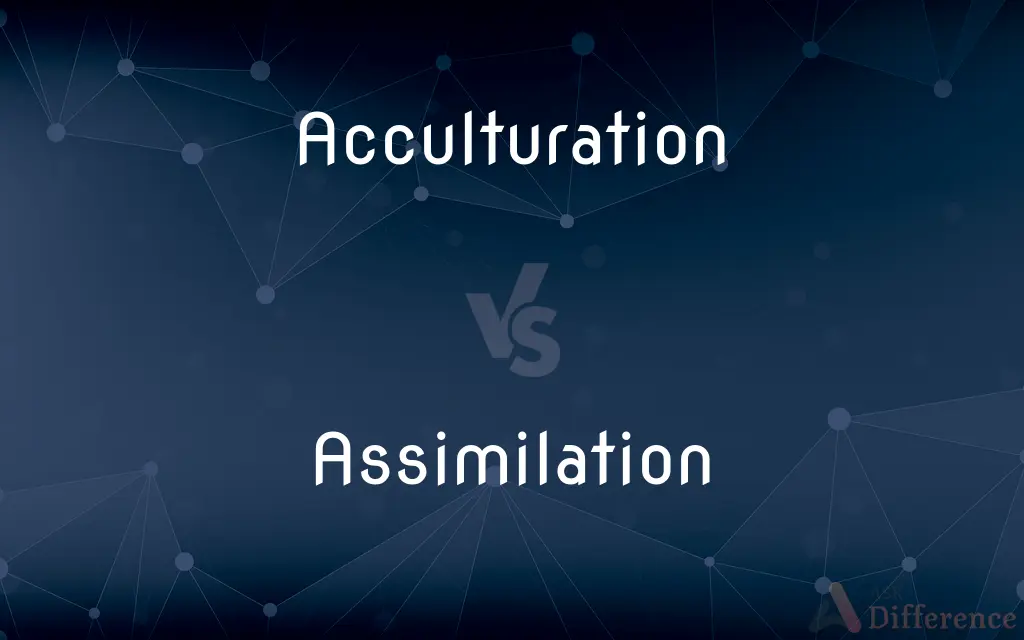Acculturation vs. Assimilation — What's the Difference?
By Tayyaba Rehman & Urooj Arif — Updated on March 16, 2024
Acculturation involves cultural exchange and adaptation, while assimilation entails fully absorbing into a dominant culture.

Difference Between Acculturation and Assimilation
Table of Contents
ADVERTISEMENT
Key Differences
Acculturation is a process where individuals or groups from different cultures come into contact and exchange cultural features, leading to changes in both parties. Assimilation, on the other hand, is the process where an individual or group's language, customs, and beliefs are absorbed by the dominant culture, often leading to the loss of the original cultural identity.
Acculturation allows for a degree of cultural retention and the adoption of new cultural practices, resulting in a blend of cultures. Assimilation, whereas, often results in the minority culture becoming indistinguishable from the dominant one, potentially erasing original cultural identities.
In acculturation, individuals maintain key aspects of their original culture while adapting to the new environment. In contrast, assimilation involves a one-sided process where the minority culture gradually adopts the characteristics of the dominant culture until the original cultural traits are minimized or lost.
Acculturation can occur reciprocally, with both cultures influencing each other, although not necessarily to the same extent. Assimilation, on the other hand, is generally unidirectional, focusing on the minority culture's absorption into the dominant culture.
Comparison Chart
Definition
Mutual cultural exchange and adaptation between groups
Full integration of one culture into another, often losing original cultural identity
ADVERTISEMENT
Process
Bi-directional, involving changes in both cultures
Unidirectional, with the minority culture adopting the traits of the dominant culture
Cultural Retention
Retains aspects of original culture while adopting new ones
Often leads to the loss of the original culture
Outcome
Blended cultural practices and identities
Homogenization with the dominant culture
Examples
Immigrants adopting the language of the new country while maintaining their culinary traditions
Immigrants fully adopting the language, customs, and values of the new country, losing ties to their original culture
Compare with Definitions
Acculturation
The process of cultural exchange and adaptation between different cultural groups.
After moving to Brazil, the family incorporated local dishes into their meals while still celebrating their traditional festivals.
Assimilation
Involves the one-sided adoption of the dominant culture's language, values, and behaviors.
To fit in, the newcomer adopted the local dress code and social norms, gradually letting go of her traditional attire.
Acculturation
Encourages cultural diversity and the enrichment of societal fabric.
The city's cultural festival showcased music, dance, and food from its diverse immigrant communities.
Assimilation
The process by which individuals or groups fully integrate into a dominant culture, often losing their original cultural traits.
Over generations, the immigrant family's native language and customs were replaced by those of the dominant culture.
Acculturation
Can result in a hybrid cultural identity, blending elements from both original and new cultures.
The artist's work blended traditional indigenous motifs with contemporary urban styles.
Assimilation
Can lead to the erasure of unique cultural identities and traditions.
The indigenous community lost many of their ancestral practices after years of forced assimilation.
Acculturation
Can lead to greater understanding and tolerance between different cultural groups.
Participating in cultural exchange programs helped students appreciate the values and traditions of other cultures.
Assimilation
Often driven by the desire for social acceptance or economic advancement within the dominant culture.
The immigrant changed his name and accent to better assimilate into the workplace and advance his career.
Acculturation
Involves adopting elements of the surrounding culture while retaining one's cultural identity.
The immigrant learned the local language and customs but continued to speak her native language at home.
Assimilation
May result in a homogenized society with diminished cultural diversity.
The neighborhood's diverse cultural landscape gradually homogenized as newer generations assimilated into the mainstream culture.
Acculturation
Acculturation is a process of social, psychological, and cultural change that stems from the balancing of two cultures while adapting to the prevailing culture of the society. Acculturation is a process in which an individual adopts, acquires and adjusts to a new cultural environment as a result of being placed into a new culture, or when another culture is brought to you.
Assimilation
The process of taking in and fully understanding information or ideas
The assimilation of the knowledge of the Greeks
Acculturation
The modification of the culture of a group or individual as a result of contact with a different culture.
Assimilation
The absorption and digestion of food or nutrients by the body or any biological system
Nitrate assimilation usually takes place in leaves
Acculturation
The process by which the culture of a particular society is instilled in a human from infancy onward.
Assimilation
The process of becoming similar to something
Watson was ready to work for the assimilation of Scots law to English law where he thought it was justified
Acculturation
A process by which the culture of an isolated society changes on contact with a different one.
Assimilation
The act or process of assimilating.
Acculturation
A process by which a person acquires the culture of the society that they inhabit, starting at birth.
Assimilation
The state of being assimilated.
Acculturation
The adoption of the behavior patterns of the surrounding culture;
The socialization of children to the norms of their culture
Assimilation
(Physiology) The conversion of nutriments into living tissue; constructive metabolism.
Acculturation
All the knowledge and values shared by a society
Assimilation
(Linguistics) The process by which a sound is modified so that it becomes similar or identical to an adjacent or nearby sound. For example, the prefix in- becomes im- in impossible by assimilation to the labial p of possible.
Acculturation
The process of assimilating new ideas into an existing cognitive structure
Assimilation
The process whereby a minority group gradually adopts the customs and attitudes of the prevailing culture.
Assimilation
The act of assimilating or the state of being assimilated.
Assimilation
The metabolic conversion of nutrients into tissue.
Assimilation
(by extension) The absorption of new ideas into an existing cognitive structure.
Assimilation
(phonology) A sound change process by which the phonetics of a speech segment becomes more like that of another segment in a word (or at a word boundary), so that a change of phoneme occurs.
Assimilation
The adoption, by a minority group, of the customs and attitudes of the dominant culture.
Assimilation
The act or process of assimilating or bringing to a resemblance, likeness, or identity; also, the state of being so assimilated; as, the assimilation of one sound to another.
To aspire to an assimilation with God.
The assimilation of gases and vapors.
Assimilation
The conversion of nutriment into the fluid or solid substance of the body, by the processes of digestion and absorption, whether in plants or animals.
Not conversing the body, not repairing it by assimilation, but preserving it by ventilation.
Assimilation
The state of being assimilated; people of different backgrounds come to see themselves as part of a larger national family
Assimilation
The social process of absorbing one cultural group into harmony with another
Assimilation
The process of absorbing nutrients into the body after digestion
Assimilation
A linguistic process by which a sound becomes similar to an adjacent sound
Assimilation
The process of assimilating new ideas into an existing cognitive structure
Assimilation
In the theories of Jean Piaget: the application of a general schema to a particular instance
Common Curiosities
What is assimilation?
Assimilation is when an individual or group fully adopts the dominant culture's norms, values, and behaviors, often at the expense of their original cultural identity.
How do acculturation and assimilation impact multicultural societies?
Acculturation can enrich multicultural societies by promoting diversity and mutual understanding, while assimilation might reduce cultural diversity by favoring a dominant culture.
Can acculturation lead to assimilation?
Acculturation can sometimes lead to assimilation, especially if the cultural exchange is significantly one-sided, favoring the dominant culture.
Why might someone choose assimilation over maintaining their original cultural identity?
Individuals might choose assimilation for various reasons, including social acceptance, economic opportunities, or pressure from the dominant culture.
What role does language play in acculturation and assimilation?
Language is a key element, with acculturation often involving bilingualism or multilingualism, and assimilation leading to the adoption of the dominant language at the expense of the original one.
What impact does globalization have on acculturation and assimilation?
Globalization can accelerate both acculturation and assimilation by increasing cultural exchanges and pressures towards a global culture, impacting local and indigenous cultures.
What is acculturation?
Acculturation is the process where individuals or groups from different cultures engage in an exchange, leading to changes in both cultures while retaining some original cultural elements.
Is it possible to undergo acculturation without losing one's original cultural identity?
Yes, acculturation often allows individuals to adapt to a new culture while maintaining their original cultural identity, creating a hybrid cultural experience.
How do individuals navigate the challenges of acculturation?
Individuals navigate acculturation by finding a balance between adapting to the new culture and preserving essential aspects of their original culture, often through community support and personal resilience.
How do acculturation and assimilation differ in terms of cultural exchange?
Acculturation involves a mutual exchange between cultures, potentially affecting both, while assimilation involves one culture adopting the traits of another, often without reciprocity.
Can assimilation be forced by external pressures?
Yes, assimilation can be forced by societal pressures, policies, or historical circumstances that favor the dominant culture over minority ones.
How does acculturation affect identity?
Acculturation can lead to a complex, layered identity that incorporates elements of both the original and new cultures, enhancing personal and collective cultural narratives.
What are the benefits of maintaining cultural diversity through acculturation?
Cultural diversity enriches societies by fostering innovation, creativity, and empathy, promoting a more inclusive and dynamic community.
Can acculturation lead to social tension?
While acculturation can promote understanding, it can also lead to social tensions if there is resistance to cultural change or if the cultural exchange is perceived as unequal.
Share Your Discovery

Previous Comparison
Hero vs. Villain
Next Comparison
Silane vs. SiloxaneAuthor Spotlight
Written by
Tayyaba RehmanTayyaba Rehman is a distinguished writer, currently serving as a primary contributor to askdifference.com. As a researcher in semantics and etymology, Tayyaba's passion for the complexity of languages and their distinctions has found a perfect home on the platform. Tayyaba delves into the intricacies of language, distinguishing between commonly confused words and phrases, thereby providing clarity for readers worldwide.
Co-written by
Urooj ArifUrooj is a skilled content writer at Ask Difference, known for her exceptional ability to simplify complex topics into engaging and informative content. With a passion for research and a flair for clear, concise writing, she consistently delivers articles that resonate with our diverse audience.














































